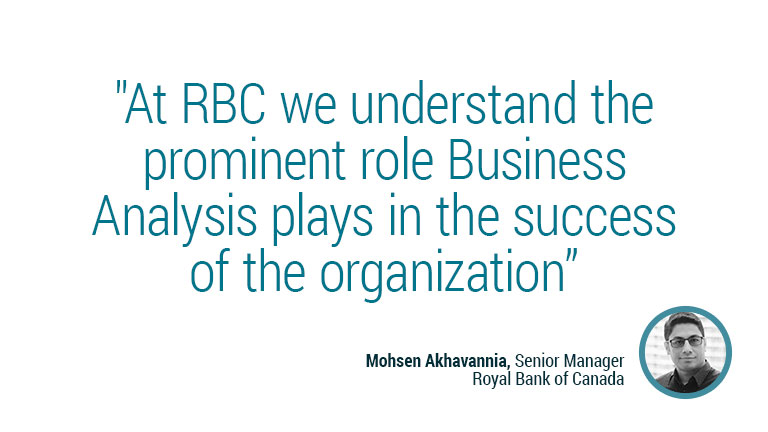The Role Business Analysts Play in the Success of Organizations
The alignment of business analysis value to internal stakeholders increases recognition and importance of the role and is a key driver of agile transformation enterprise wide.
Overview

Royal Bank of Canada (RBC) employs approximately 80,000 associates globally with a team of nearly 900 Business Analysts. RBC’s Requirements Centre of Excellence (CoE) is responsible for setting the strategic direction and standards for RBC requirements management processes across the bank. Moving at a fast pace in a large enterprise, it’s a challenge to educate other lines of business on the value and importance of business analysis working in both agile and non-agile methodologies.

Royal Bank of Canada
Industry: Finance
Location: Global
Size: Over 86,000 Employees
Company Bio
The Royal Bank of Canada is a Canadian multinational financial services company and the largest bank in Canada by market capitalization. The bank serves over 16 million clients worldwide.

Business Challenges
To support talent management, RBC designed a Business Analyst (BA) practitioner development lifecycle framework aligned with IIBA’s Business Analysis Competency Model that consists of a 360-degree assessment executed by BAs, their team leads and managers, resulting in a defining annual goal for the Business Analyst. Since joining IIBA as a Corporate Member in 2018, the bank has promoted certification for Business Analysts to improve their technical skills as part of RBC’s continuous professional development and assessment program for BA practitioners.
Targeting stakeholders to work with Business Analysts and contribute to business analysis practices ensures business goals and project objectives are aligned when working on processes and projects. RBC uses IIBA’s Guide to Business Analysis Body of Knowledge (BABOK® Guide) and the Agile Extension to the BABOK® Guide as its main reference for its practice. Enterprise-wide, all Business Analysts follow RBC’s tooling strategy for a consistent approach that enables teams to collaborate effectively across the business. Utilizing a requirement and artefacts repository across projects identifies processes and standards for a fully integrated business and solution team that are useful for both business and technical stakeholders.
The Business Analyst plays a role working with both agile and non-agile methodologies. Recognizing business analysis as a key role in Agile teams is important not only to recognize the value add of business analysis but also because Business Analysts are the drivers of Agile transformation. While not all projects have the potential to adopt Agile methodologies, identifying processes and standards for a fully integrated business and solution that are useful for both business and technical stakeholders enable non-Business Analysts to understand the importance of business analysis best practices. Members of the solution team working with Product Owners all play some form of a business analyst role.
The Solution

The Requirements CoE focuses on people, process and tools for business analysts working in agile and non-agile projects in both business and technology, and product development. The CoE defines business analysis activities and best practices executed in an enterprise framework and development methodologies used. Following RBC enterprise tooling strategies, Business Analysts collaborate more effectively executing requirements management and analysis activities. Focusing on industry standards and notations that are tool independent improves value for the entire organization.
The Approach

Using standard practices and notations enables RBC’s Business Analysts to produce reliable results in a consistent form on all projects by utilizing a common repository for requirements and artefacts. Following RBC’s enterprise tooling strategy for business analysis tools, automation and integration enables the BA team to collaborate better with teams they work with resulting in better productivity.
The Results
The alignment of business analysis value to internal stakeholders increases recognition and importance of the role and is a key driver of agile transformation enterprise wide. Through the transition to Agile, the CoE sees improved agility and re-usability through business analysis. At RBC there is a clear role for Business Analysts on Agile teams to realize successful outcomes. In 2019, RBC was acknowledged for their talent management strategy as recipients of the Leadership Excellence in the Advancement of Professional Development in Business Analysis award from IIBA. This recognition has encouraged RBC to continue to push for certifications and to support continuous education for Business Analysts.